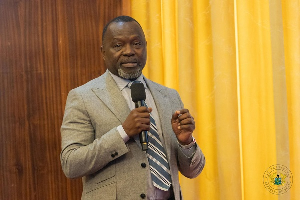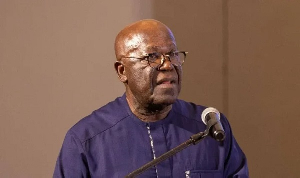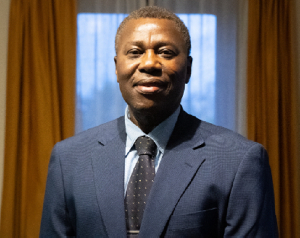By Kwame Okoampa-Ahoofe, Jr., Ph.D.
Those vehemently clamoring for the removal of Gen. Kotoka’s name from the former Accra International Airport risibly forget that like the latter, any number of cynically tangible reasons can be given as to why renaming Kumasi’s University of Science and Technology after the late President Kwame Nkrumah may also be aptly deemed to be grossly improper and even outright criminal by their ideological opponents.
It was thus with amused contempt that I read Mr. Kofi Kakraba Pratt’s article titled “Renaming Kotoka International Airport – A Slight Difference” (Ghanaweb.com 9/24/10), in which the author mischievously carped the heroic defenders of Ghanaian democracy who gloriously and opportunely accorded the heave-ho to Mr. Nkrumah on February 24, 1966. Needless to say, many of his fanatic supporters conveniently, absurdly and invariably discount the glaring fact that by the eve of his ouster, the Convention People’s Party (CPP) pontiff had unilaterally declared Ghana a one-party state and himself Ghana’s President-for-Life.
What these evidently cognitively addled fanatics adamantly refuse to accept, even to this Information Age, is that none of these unilateral declarations constituted a legitimate part of the social contract that brought the erstwhile Gold Coast into being as Ghana on March 6, 1957. And so wherein lies the validity of the rather tired and downright nauseating assumption that, somehow, in effectively sweeping the neo-fascist CPP off the Ghanaian political landscape, the National Liberation Council (NLC) had, indeed, overthrown a legitimately constituted government of the people?
Secondly, the facile and stupidly self-righteous and knee-jerk trotting in of the United States’ Central Intelligence Agency (CIA) on the least opportunity, almost as if to imply that suppressed, repressed and oppressed Ghanaian citizens on their own were, somehow, rather too naïve and daft to vigorously protect their own inalienable human rights, is one that is too logically offensive for any well-meaning Ghanaian citizen to abide.
But, perhaps, what is even more significant to highlight on this front, is the fact that even as Mr. J. W. K. Harlley, the chief-mastermind of the 1966 coup, eloquently attested (See the report of the Asafu-Adjei Commssion of Enquiry that investigated the prison assassination of Dr. J. B. Danquah at the Nsawam Medium-Security Prison), the CIA was not the very first collaborative agency that was solicited to facilitate the auspicious overthrow of Mr. Nkrumah and his Convention People’s Party regime. That remarkable honor and privilege was accorded Britain, whose Prime Minister’s self-felt bounden obligation to a bona fide member of the Commonwealth precluded either its oblique or direct involvement in the landmark overthrow of the African Show Boy.
And, perhaps, it might, somewhat, opiate their delirious sense of grief to also learn that the extant British Prime Minister had even threatened Mr. Harlley with the likely alerting of the then widely despised dictator, if the human rights-loving police chief insisted on pestering British intelligence agencies for both logistical and strategic support of Nkrumah’s overthrow.
Nonetheless, what needs to be emphasized is the incontrovertible fact of President Nkrumah’s having inordinately and self-servingly allied himself with the erstwhile Soviet Union, in particular, and the Eastern Bloc countries, in general, in order to doggedly pursue a brand and breed of political culture that dangerously threatened the fundamental human and civil rights of the very people who had elected him with the objective purpose of having the preceding jealously guarded. And here also, it is interesting to observe that, to-date, none of his ardent and blind supporters appears to have enquired precisely why the Soviet Union would consent to constructing a nuclear power plant at Kwabenya for Mr. Nkrumah, as well as awarding the Ghanaian dictator the Lenin Prize, the Soviet equivalent of the Nobel Prize. And even more importantly, the amount of capital investment it cost the Ghanaian taxpayer to convince a putatively miserly and/or tight-fisted Moscow to prosecute such a globally sensitive security project.
Needless to say, for pretty much the same reasons that the Nkrumacrats have adamantly refused to reckon the avoidable waste engendered by their hero’s ramming of the slavish Volta Scheme down the throats of Ghanaians, the Nkrumah fanatics are highly unlikely to wake up anytime soon to take a socio-economically responsible view of the nightmarish tragedy that was Nkrumaism. I have amply documented the epic excesses of the African Show Boy in my long series of article titled “When Dancers Play Historians and Thinkers” and thus see no reason for reprising the same here.
On the question of renaming the University of Science and Technology after Kwame Nkrumah who, by the way, originally named the same institution after himself, it may be quite instructive to learn that what the Show Boy essentially did was to simply transfer the original Science and Technology Department from the Danquah-founded University of Ghana at Legon to Kumasi. He would do the same with Legon’s Department of Education by transferring the latter to Cape Coast. And so on the question of who really qualifies to be designated Africa’s Prometheus of the twentieth century, the choice is quite clear and incontrovertible.
*Kwame Okoampa-Ahoofe, Jr., Ph.D., is Associate Professor of English, Journalism and Creative Writing at Nassau Community College of the State University of New York, Garden City. He is a Governing Board Member of the Accra-based Danquah Institute (DI) and the author of 21 books, including “Dr. J. B. Danquah: Architect of Modern Ghana” (iUniverse.com, 2005). E-mail: okoampaahoofe@optimum.net. ###
Opinions of Monday, 4 October 2010
Columnist: Okoampa-Ahoofe, Kwame














